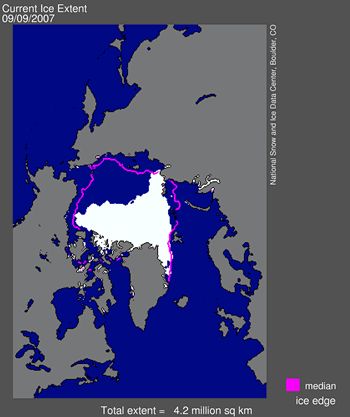Polar Ice Cap Collapse
There have been a number of news stories published in the past several days reporting on the acceleration of the annual summer retreat of the Arctic ice cap. The shrinkage is at its greatest extent in the month of September, before the colder winter temperatures start the refreezing process, but this has been a year like no other ever recorded: As of September 9th, about 1.63 million square miles of sea ice remained—20% less than the lowest ever known—and it is still shrinking.
In order to illustrate the extent of the recession, I put together an animation using the daily images of sea ice concentration from the National Snow and Ice Data Center.1
Polar Sea Ice Retreat: 08/01/2007–09/14/2007
Notice the extent of the retreat in the areas north of the Beaufort, Chukchi and East Siberian Seas off Alaska and Russia. (To the right of the North Pole in the animation.) This huge area of ice-free ocean has been exposed for the first time.
The Northwest Passage is completely open, and the Northeast Passage across the top of Russia is blocked by only a thin tongue of ice. The figure below shows the average September ice extend from 1979-2000.

1 Maslanik, J., and J. Stroeve. 1999, updated daily. Near real-time DMSP SSM/I daily polar gridded sea ice concentrations, 08/01/2007-09/14/2007. Boulder, Colorado USA: National Snow and Ice Data Center. Digital media.

Greenland Ice Melt
Greenland is one of the most cartographically interesting landmasses on the planet. But while the following graphic is visually appealing, the story it exposes is altogether distressing:

The map shows that areas along the ice cap edge had more melting days in 2005 than the average back to 1988. It is based on satellite data which can detect the difference in reflected microwave emissions between wet and dry snow. More info at NASA’s Earth Observatory site here.
A friend of mine recently mentioned that he had just finished reading Barry Lopez’ brilliant Arctic Dreams which was originally published in 1986. What he realized afterwards was that the term “global warming” didn’t appear even once. Searching through the text on Amazon shows he was right. Nothing about global warming or the greenhouse effect was even a consideration. It’s a pretty stark indication of how quickly things have changed.

